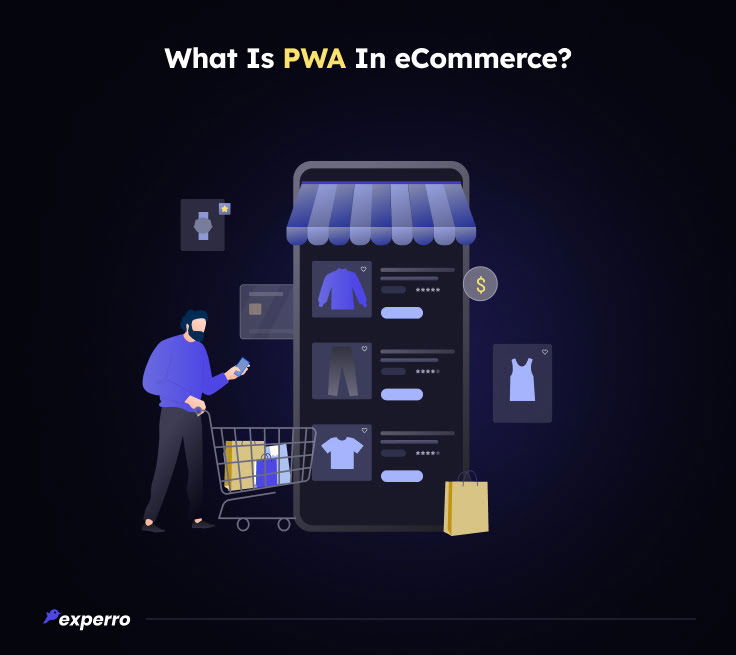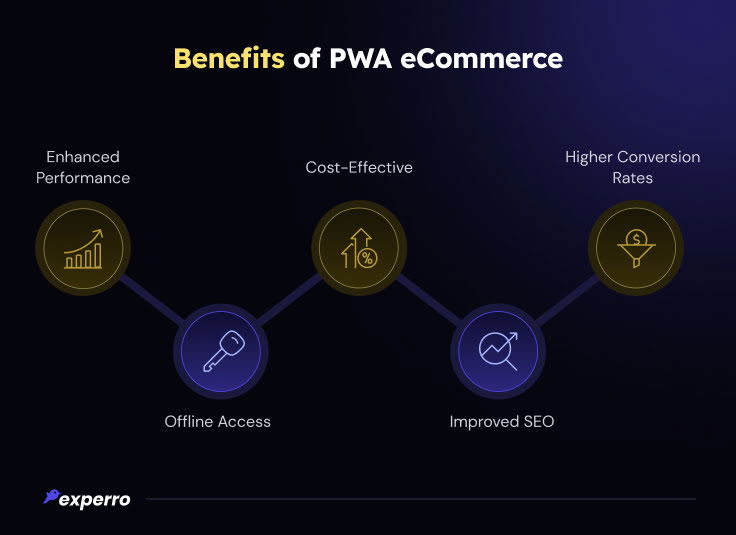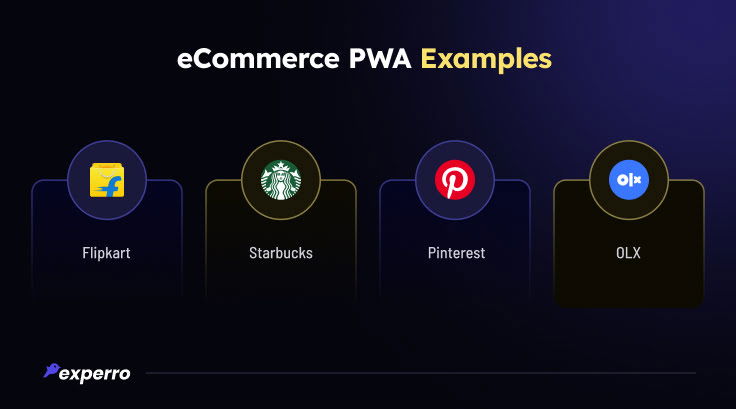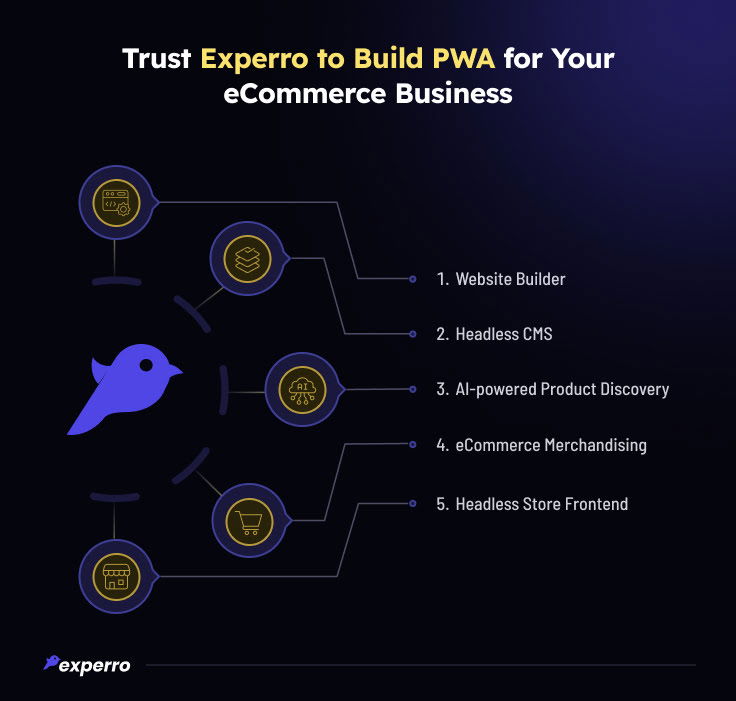What Is PWA eCommerce and Why Is It the Future?

What’s Inside
- What Is PWA In eCommerce?
- What Are the Features of eCommerce Progressive Web Apps?
- What Are the Benefits of PWA eCommerce?
- Choose Experro to build cutting-edge eCommerce PWA solutions for unparalleled performance.
- Why Choose PWAs Over Traditional eCommerce Websites?
- What Are the eCommerce PWA Examples?
- How Does Headless Approach Benefit Progressive Web App?
- Steps to Build a PWA for eCommerce Business
- How Can Experro Help You With PWA eCommerce?
- Choose Experro to revolutionize your PWA eCommerce platform with an advanced, user-friendly website builder.
- Conclusion
KEY TAKEAWAYS
- PWA eCommerce combines the best of web and mobile apps, providing a fast and seamless user experience.
- The headless approach in PWA eCommerce development allows for greater flexibility and easier integration with third-party services.
- Experro's website builder empowers businesses to create responsive, mobile-first PWA eCommerce sites without requiring extensive technical knowledge from the user.
Is your online store ready to enhance user experience and performance?
PWA eCommerce (Progressive Web App eCommerce) offers the perfect solution to future-proof your online retail presence.
By combining the best features of web and mobile apps, eCommerce PWA solutions offer lightning-fast, reliable, and engaging mobile shopping experience on every device.
Progressive web apps for eCommerce websites offer several advantages, including offline capability, quick loading times, and seamless app-like user interactions.
Investing in PWA eCommerce development can significantly enhance your customer’s shopping experience.
Embracing an eCommerce PWA solution can help your business meet modern consumer demands and stay competitive in the ever-evolving market.
What Is PWA In eCommerce?

A Progressive Web App (PWA) in eCommerce is a web application that offers a seamless, fast, and reliable shopping experience, combining the best features of web and mobile apps.
In today's digital world, businesses are increasingly turning to PWA for eCommerce to enhance customer experiences.
eCommerce PWA is designed to be highly responsive, offering a native app-like experience on both desktop and mobile devices.
What Are the Features of eCommerce Progressive Web Apps?
Adopting a PWA for your eCommerce business can significantly enhance the user experience and help you drive more conversions.

Let's explore the key features:
1. Drag & Drop Elements
PWAs enable intuitive design capabilities with drag & drop elements. This feature allows users to customize their eCommerce site without any coding skillset.
Simplifying the design process helps businesses quickly build PWA for eCommerce platform.
This makes the process efficient and user-friendly, offering a seamless experience for non-technical users. It is an excellent feature for businesses looking to start PWA for eCommerce.
2. Push Notifications
Push notifications are a powerful tool in PWA eCommerce development. They enable businesses to send timely updates and promotional messages directly to users.
This feature keeps customers engaged and informed about new products and offers. Push notifications can significantly increase re-engagement and drive repeat purchases.
3. Responsive Mobile-First Designs
A key advantage of PWA for eCommerce websites is their responsive design.
PWAs automatically adjust to different screen sizes, ensuring a consistent device experience. This responsiveness improves user satisfaction and retention.
Responsive designs are crucial for PWA eCommerce mobile app users who demand seamless smartphone, tablet, or desktop performance.
4. Automatic Updates
Automatic updates in eCommerce PWA development ensure that users always have the latest version without manual intervention.
This feature reduces the friction associated with traditional app updates. Users benefit from new features and security enhancements instantly.
For businesses, it means delivering a continuously optimized experience without the hassle of prompting users to update.
5. Better Security
PWAs leverage HTTPS to ensure a secure connection, protecting sensitive user data. This feature builds trust with customers, encouraging them to complete transactions.
Enhanced security measures in a PWA eCommerce solution protect businesses from data breaches and other cyber threats.
It ensures a safe shopping environment with consent management for all users.
What Are the Benefits of PWA eCommerce?
Progressive Web Apps in eCommerce offer a seamless blend of web and mobile app functionalities, providing an enriched user experience.

Let's explore the key benefits of PWAs:
1. Enhanced Performance
Progressive web applications offer load faster than traditional websites. This speed is crucial for eCommerce sites where online shoppers expect quick product results and an ever-smoother checkout process.
With PWA eCommerce, images and content load instantly, reducing the bounce rate.
Improved speed with mobile CMS also leads to higher customer satisfaction and better retention rates.
PWA in eCommerce ensures that users have a smooth shopping experience.
2. Offline Access
One of progressive web app eCommerce's standout features is offline access. Users can browse products even without an internet connection.
This is possible because PWAs cache data during the first visit. So, PWA for eCommerce websites ensures continuous user engagement, regardless of connectivity issues.
Thus, offline functionality is particularly beneficial for eCommerce PWA mobile first website or an app.
3. Cost-Effective
PWA eCommerce development is cost-effective. You don't need separate development teams for iOS, Android, and web platforms.
A single eCommerce PWA solution works across all devices. This reduces development and maintenance costs.
However, headless PWA eCommerce development allows you to update the frontend without affecting the backend, saving time and resources.
4. Improved SEO
PWA eCommerce sites are SEO-friendly as they are indexed by search engines, improving visibility.
Faster loading times and better performance enhance SEO rankings. Implementing React PWA eCommerce can further optimize your site's search engine performance.
By leveraging PWA eCommerce SEO platforms, you ensure that your site remains competitive and ranks higher in search results.
5. Higher Conversion Rates
Fast load times and offline access improve user experience. This leads to higher engagement and more sales.
Build eCommerce PWA to offer users an app-like experience without downloading an app.
eCommerce PWA case studies demonstrate significant increases in conversion rates after adopting PWAs.
Why Choose PWAs Over Traditional eCommerce Websites?
Here’s a comparison to show why progressive web apps (PWAs) are better:
| Aspect | PWA | Traditional eCommerce Website |
|---|---|---|
| Performance | Fast loading times | Slow loading times |
| Offline Mode Access | Available | Not available |
| User Experience | App-like, responsive, and engaging | Web-like, can be less engaging |
| Installation | Can be installed on the home screen | No installation required |
| Push Notifications | Supported | Limited support |
| Development Cost | Single development for all platforms | Separate development for web and mobile |
| Engagement and Conversion | Higher due to superior experience | Lower compared to PWA |
What Are the eCommerce PWA Examples?
Progressive web apps (PWAs) are transforming the eCommerce landscape by combining the best of web and mobile apps.

Here are some notable PWA eCommerce examples that showcase their effectiveness in enhancing user experience.
1. Flipkart
Flipkart's PWA for eCommerce known as Flipkart Lite provides a fast and engaging mobile web experience.
It reduced data usage significantly and tripled the time on-site. This PWA eCommerce solution is a great example of enhancing accessibility and performance.
2. Starbucks
Starbucks' PWA for eCommerce delivers a seamless experience, even in low network conditions. It enables users to browse the menu and customize orders.
This PWA eCommerce mobile app doubled the number of web users who place orders daily.
3. Pinterest
Pinterest Lite, a progressive web app eCommerce, saw a substantial increase in user engagement compared to their traditional web experience.
With a 60% increase in core engagements, this PWA for eCommerce websites demonstrated the power of faster load times and better user experiences.
4. OLX
OLX’s eCommerce PWA improved re-engagement by 250% and reduced bounce rates by 80%.
This eCommerce PWA case study shows how a PWA platform can improve performance and user satisfaction significantly.
How Does Headless Approach Benefit Progressive Web App?
The headless architecture revolutionizes the way we build and manage PWA eCommerce sites. By decoupling the frontend and backend, it allows for greater flexibility and customization.
This approach is particularly beneficial for eCommerce PWA. It enables developers to create dynamic, fast-loading, and responsive PWA for eCommerce websites.
The combination of a progressive web app eCommerce experience and a headless CMS leads to better user engagement, higher conversion rates, and an improved mobile search web experience.
PWAs provide a seamless, responsive interface, while a headless CMS allows for greater flexibility and customization.
Many businesses now opt for progressive web application eCommerce development to provide their customers with an app-like experience on the web.
The headless PWA eCommerce development approach also allows for easier integration with third-party services and platforms. This means businesses can quickly adapt to new trends without overhauling their entire system.
Steps to Build a PWA for eCommerce Business
Curious about creating a seamless, app-like experience for your eCommerce customers?
Progressive web apps (PWAs) offer that by combining the best features of web and mobile apps. You don’t need to use standard PWA eCommerce templates. Instead, choose custom PWA website development with Experro.
Here’s a step-by-step guide to help you get started:
1. Understand PWA Basics
Before diving into development, grasp the fundamentals of PWAs.
It ensures you can make informed decisions, utilize features to their fullest potential, and ultimately enhance user experience and business outcomes.
Additionally, a solid grasp of fundamentals allows for smoother troubleshooting and more efficient implementation of advanced capabilities.
2. Choose the Right Platform
Select the appropriate platform with in-built capabilities for PWA development, i.e., Experro.
The platform offers robust features for AI-powered search, easy third-party integrations, and eCommerce merchandising to streamline the development process.
Ensure the platform you choose supports all necessary features like seamless integrations. This will simplify your workflow and enhance the app's performance.
3. Design a Mobile-First Approach
Start with a mobile-first design approach to ensure a responsive and user-friendly experience.
Mobile-first design prioritizes smaller screens, making sure the PWA looks well on mobile devices.
This approach also ensures that your app will scale well on larger screens. Focus on a clean, intuitive design that enhances user engagement.
4. Add Web App Manifest
A web app manifest is a JSON file that provides essential information about your PWA. It includes details like the app's name, icons, and start URL.
Adding a web app manifest makes your PWA installable on users’ devices.
Ensure your web app manifests include all necessary metadata, such as app name, icons, and theme color, to enhance the user experience and promote the app effectively.m
5. Optimize Performance
Performance optimization is crucial for a successful PWA. Use techniques like lazy loading, image optimization, and efficient caching strategies.
Implement service workers to manage network requests and ensure quick load times even on slow networks.
A fast, smooth experience will keep users engaged and reduce bounce rates.
6. Test Across Devices and Browsers
Thoroughly test your PWA on various devices and browsers to ensure compatibility and performance.
Use tools for auditing and improving the app. Testing helps identify and fix bugs, ensuring a consistent experience across all platforms.
Make sure your PWA functions well in different environments to reach a broader audience.
7. Publish and Monitor
Once your PWA is ready, publish it and continuously monitor its performance. Use analytics tools to track user engagement and performance metrics.
Regular monitoring helps identify areas for improvement and ensures the app runs smoothly.
Stay updated with the latest PWA trends and technologies to keep your app relevant and efficient.
How Can Experro Help You With PWA eCommerce?

Experro is a Digital Experience Platform (DXP) that adds to the capabilities of an eCommerce PWA by using headless architecture.
One of the key benefits of Experro is its ability to integrate seamlessly with various third-party services, offering flexibility and scalability for your eCommerce PWA development.
It allows businesses to create fast, and responsive PWA for eCommerce sites. The platform includes a robust headless CMS, AI-powered product discovery, advanced eCommerce merchandising, and powerful website builder.
The website builder helps create a mobile-first headless storefront without needing extensive technical knowledge, allowing teams to focus on growth.
Conclusion
Embracing progressive web application eCommerce is essential for businesses to boost their online presence and provide an enhanced user experience.
The headless PWA eCommerce development approach boosts flexibility and scalability. It makes it easier to integrate modern web technologies and meet evolving consumer demands.
Experro's website builder empowers both technology efficient and non-tech savvy entrepreneurs to create responsive PWA eCommerce sites without extensive technical knowledge.
By adopting PWA eCommerce solutions, businesses can stay competitive, improve eCommerce SEO, and drive higher conversion rates. This secures their place in the future for online retailers.
Stay tuned to learn more or schedule a call with our team.
FAQs


Pallavi Dadhich
02 July 2024Pallavi is an ambitious author known for her expertise in crafting compelling content across various domains. Beyond her professional pursuits, Pallavi is deeply passionate about continuous learning, often immersing herself in the latest industry trends. When not weaving words, she dedicates her time to mastering graphic design.